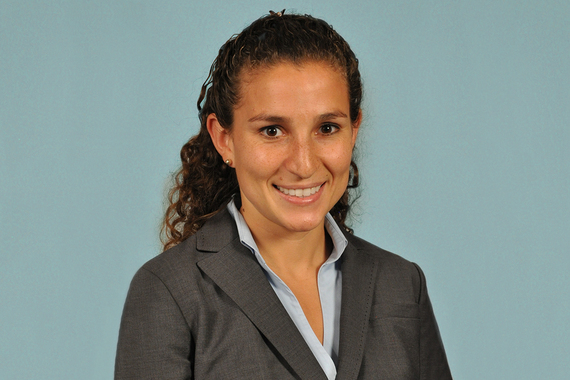In April 2014, the terrorist organization Boko Haram kidnapped 276 schoolgirls from their dorm rooms in Chibok, Nigeria. In response to these kidnappings, and continued violence against women and girls in Northern Nigeria, the Georgetown Institute for Women, Peace and Security (GIWPS) brought together representatives from major multinational corporations with operations in Nigeria to highlight the need for safe schools and encourage collaboration and collective action. Accenture was one of these companies, and I was asked to help create a document as part of this pro-bono project that could provide a path forward by combining resources and strategies among these companies.
My role included joining initial conversations among the leaders who could create change, including the Institute's Executive Director and the former U.S. Ambassador for Global Women's Issues, Melanne Verveer, and Nigeria's former Finance Minister, Ngozi Okonjo-Iweala.
These conversations showed that companies were often siloed in their operations or activities, limiting collaboration between organizations. In response, Accenture and the GIWPS Women & Economy Project created a landscape analysis of existing programs to identify collaborative opportunities. They leveraged expertise and resources and shared experiences and best practices. Such a report had previously not existed, and we believe this is the first step to increased collaboration and improved overall impact to produce real benefits to the women and children in Nigeria.
In writing this report, my co-author, Patrick Fagbola, and I interviewed eight of the largest multinational corporations in Nigeria including Chevron, General Electric, Intel, MasterCard and Microsoft. In each of our interviews we asked the relevant teams working on development initiatives in Nigeria a series of questions around the kinds of programs they have, their locations, existing collaboration and partnerships, and the challenges faced in program implementation. We focused solely on corporate social responsibility and development initiatives in the areas of health, education, and women and girls' empowerment. It allowed us to learn about efforts ranging from puberty education, tutoring and scholarship programs, and entrepreneurship training for new business owners.
Our individual conversations generated a wealth of information and insights that extended well beyond what you would find in a corporate annual report. It was fascinating to learn about the different areas of focus, and promising to see the myriad of efforts addressing so many of the struggles these women and girls deal with on a daily basis. A challenge many companies noted was the unsafe conditions in the Northeast, where a focus on women and girls is most critical. Another, perhaps more deeply ingrained and challenging area discussed was the cultural norms that hindered women's access to education. This issue negatively impacted overall skill level and the ability to benefit from the efforts focusing on the more complex components of business acumen and more advanced skills training.
Through partnerships with local governments or nonprofits, the overall volume of effort was remarkable. We were also able to gather success stories of partnerships that we have highlighted in our report. We hope that with continued conversations, more of these "best practices" are shared and utilized to increase overall impact. We also focused on providing a series of specific recommendations for companies where we were able to identify opportunities for collaboration due to overlap in specific geographic areas or similar programmatic focus. We also suggested higher-level recommendations, including addressing educational outcomes through unique methods. Namely, we offer the idea of improving girls' attendance in schools by reducing the economic stress on poor households by providing direct or indirect financial support.
As companies struggle with limited financial and human resources to successfully deliver their services, it became clear that they would benefit from increased collaboration and pooled resources to enhance the effectiveness of program delivery, reduce overall duplication efforts, and potentially scale-up the operations. With the common goal of addressing challenges in Nigeria, the efficient use of existing resources is paramount.
For me, personally, this project has proved both eye-opening and important. As someone who entered the private sector with both a master's degree in International Affairs and an MBA, this project clearly demonstrated the link between these two worlds. Large, for-profit companies have the capacity to do so much in improving development outcomes, and to a large extent they are making great strides. However, to address the challenges of women and girls in places like Nigeria, it is essential that companies use their limited resources effectively and efficiently, eliminating duplication and increasing collaboration.
Talya Wyzanski is a Manager at Accenture Federal Services. She currently works with government agencies on strategic planning and process improvement and has prior experience in organizational design for a large international development organization. She has holds an MBA from Duke University, a MA in International Relations from Johns Hopkins SAIS, and a BA from Brown University.

